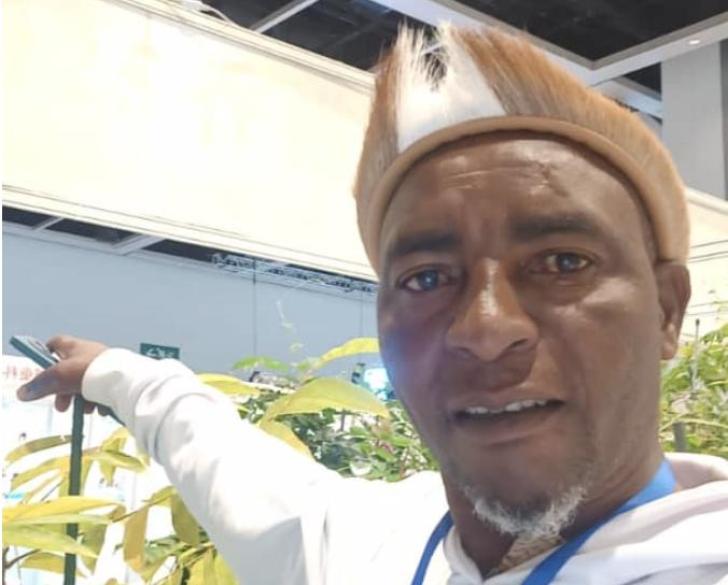News / Health
Zimbabwe showcases indigenous healing at Global Traditional Medicine Conference
28 Sep 2025 at 06:15hrs |
1022 Views

Sekuru Nyangatayani (born Peter Chingudzi)
HARARE - Traditional medicines have long been a cornerstone of healthcare in Zimbabwe, and renowned healer Sekuru Nyangatayani (born Peter Chingudzi) believes these practices can effectively complement the country's formal healthcare system.
Speaking from China, where he is attending the Hong Kong International Chinese Medicine and Traditional Medicine Conference 2025, Nyangatayani emphasized that both traditional and modern medicines are essential to sustainably transforming Zimbabwe's healthcare landscape.
Representing Zimbabwe's rich heritage, Nyangatayani is showcasing indigenous healing practices and advocating for their integration into mainstream healthcare. He argues that traditional medicine offers alternative solutions to various health challenges, potentially easing the burden on hospitals and clinics.
"By integrating traditional practices with modern medicine, Zimbabwe can adopt a more holistic approach to healthcare. This blend of old and new can improve health outcomes and enhance patient satisfaction," Nyangatayani said.
He added that the Hong Kong expo provides a vital platform for traditional healers to promote Zimbabwe's indigenous medicine sector, attract investment, and forge international partnerships.
"This exposure can lead to economic growth, job creation, and increased national revenue," he said.
Zimbabwe's diplomatic mission, led by Consul General Ellias Mutamba, is working to strengthen ties with Hong Kong, with traditional medicine identified as a key sector for potential investment.
Nyangatayani's participation underscores the potential of traditional medicine to transform livelihoods. By showcasing local products and expertise, he aims to raise awareness of Zimbabwe's cultural wealth and its role in economic development.
"This increased visibility can open doors for traditional healers, farmers, and other stakeholders," he added.
Meanwhile, Cuthbert Nyaruvenda, President of the Zimbabwe National Practitioners Association (ZINPA), echoed the call for integration.
"As traditional healers, we operate within indigenous knowledge systems. We treat patients using natural methods and refer them to clinics and hospitals for scientific diagnostics when necessary," Nyaruvenda said.
He noted that many patients report positive outcomes from traditional treatments, which helps relieve pressure on the country's formal health institutions.
"By administering traditional medicines at our surgeries, we are complementing the essential services of Zimbabwe's healthcare system," he added.
The World Health Organisation recognizes traditional medicine as a valuable healthcare resource, and many countries are integrating these practices into their national systems. Zimbabwe's traditional medicine sector stands to benefit from this growing global recognition.
By leveraging indigenous knowledge and fostering international partnerships, Zimbabwe can unlock new avenues for economic growth and improve the well-being of its citizens.
Speaking from China, where he is attending the Hong Kong International Chinese Medicine and Traditional Medicine Conference 2025, Nyangatayani emphasized that both traditional and modern medicines are essential to sustainably transforming Zimbabwe's healthcare landscape.
Representing Zimbabwe's rich heritage, Nyangatayani is showcasing indigenous healing practices and advocating for their integration into mainstream healthcare. He argues that traditional medicine offers alternative solutions to various health challenges, potentially easing the burden on hospitals and clinics.
"By integrating traditional practices with modern medicine, Zimbabwe can adopt a more holistic approach to healthcare. This blend of old and new can improve health outcomes and enhance patient satisfaction," Nyangatayani said.
He added that the Hong Kong expo provides a vital platform for traditional healers to promote Zimbabwe's indigenous medicine sector, attract investment, and forge international partnerships.
"This exposure can lead to economic growth, job creation, and increased national revenue," he said.
Zimbabwe's diplomatic mission, led by Consul General Ellias Mutamba, is working to strengthen ties with Hong Kong, with traditional medicine identified as a key sector for potential investment.
Nyangatayani's participation underscores the potential of traditional medicine to transform livelihoods. By showcasing local products and expertise, he aims to raise awareness of Zimbabwe's cultural wealth and its role in economic development.
"This increased visibility can open doors for traditional healers, farmers, and other stakeholders," he added.
Meanwhile, Cuthbert Nyaruvenda, President of the Zimbabwe National Practitioners Association (ZINPA), echoed the call for integration.
"As traditional healers, we operate within indigenous knowledge systems. We treat patients using natural methods and refer them to clinics and hospitals for scientific diagnostics when necessary," Nyaruvenda said.
He noted that many patients report positive outcomes from traditional treatments, which helps relieve pressure on the country's formal health institutions.
"By administering traditional medicines at our surgeries, we are complementing the essential services of Zimbabwe's healthcare system," he added.
The World Health Organisation recognizes traditional medicine as a valuable healthcare resource, and many countries are integrating these practices into their national systems. Zimbabwe's traditional medicine sector stands to benefit from this growing global recognition.
By leveraging indigenous knowledge and fostering international partnerships, Zimbabwe can unlock new avenues for economic growth and improve the well-being of its citizens.
Source - Byo24News
Join the discussion
Loading comments…






































